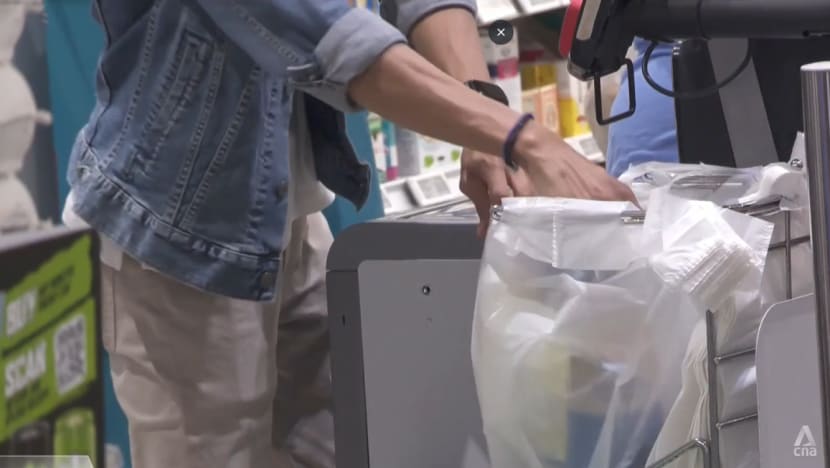Even as plastic bag use at supermarkets declines, Singapore is in early phase of sustainability transition: Experts
Singapore’s implementation of a plastic bag charge has led to the beginning of a change in norms, but mindset changes at a different rate for everyone, says a consumer behaviour expert.

It has been a year since major supermarkets were required to charge at least 5 cents for a bag at checkout from July 2023.

This audio is generated by an AI tool.
SINGAPORE: Plastic packaging manufacturer Qian Hu Tat Leng Plastic has been making disposable plastic bags for more than 40 years.
Among its clients are supermarket chains. After large chains were required to start charging at least 5 cents per bag at checkout in July last year, orders from them have nearly halved, said the firm’s assistant general manager Li Bin Hao.
The plastic bag charge only applies to large supermarket chains like Fairprice, Sheng Siong and Cold Storage.
His firm also services industries like food packaging and healthcare.
Other sectors are continuing to order the same amount of plastic bags, with the demand for trash bags even increasing 10 to 15 per cent, said Mr Li.
Heartland shop owners whom CNA spoke to said that many customers do not bring their own bags. They even ask for additional plastic bags so they can use them at supermarkets and avoid being charged.
"Sometimes they will buy three items … and ask for them to be packed separately. We tell them that it's not environmentally friendly to do so, but they insist on it so we have no choice but to give them the bags,” said one bakery owner.
TAKES TIME FOR MINDSETS TO CHANGE
Consumer behaviour expert Hannah Chang said that Singapore’s implementation of a plastic bag charge has led to the beginning of a change in norms. However, mindset changes at a different pace for everyone, she added.
The associate professor at Singapore Management University’s Lee Kong Chian School of Business said that when it comes to changing a habit, one year is fairly short.
But people appear to be getting used to the idea of planning in advance and bringing their own bags to supermarkets.
“This is something that I think in the past, before plastic bag charges were implemented, that you don't really see as often. So this indicates changing norms and habits,” she said.
Six months after the charge started, the government reported a 50 to 80 per cent drop in their use at the supermarkets.
On its part, plastic bag supplier Allswell Polythene is encouraging clients to opt for more eco-friendly options, such as plastic bags and trash bags made from recycled plastic resin.
“But the end consumers, they themselves have to exercise proper use of the bags, so as a whole, the society can actually see improvement in how we utilise one-off disposables,” said the firm’s business development manager Hannah Tien.
NEED FOR AWARENESS
While Singapore is in an early phase of its transition, it is on the right track, noted Dr Samer Hajjar, senior lecturer of marketing at the National University of Singapore Business School.
“One segment of the population has embraced these sustainable practices. The broader adoption is still in progress, and some consumers still need time to adjust to new practices,” he said.
He added that the push for more sustainable practices may not have reached people who do not frequent supermarkets, such as those who buy their groceries at the wet markets instead.
“It's a collective responsibility. Governments have to push for more incentives, more rewards for consumers who are adopting sustainable behaviours. Retailers as well have to push for more sustainable practices,” he said.
“Third parties like NGOs (non-governmental organisations) and nonprofit organisations have to educate and raise awareness.”
Assoc Prof Chang similarly said awareness is important as “many times, people may not be fully aware or cognisant of the type of negative impact the single-use plastic bag has on our environment”.
However, she noted that around the world, the rolling out of such practices usually happens slowly.
“It doesn't necessarily happen overnight to all the shops… but starts slowly, one at a time, so that people have the time to get used to it and to start adopting the habit of bringing their own bags,” she said.
The National Environment Agency previously said it will look at how effective the plastic bag charge is, before deciding whether to expand it beyond supermarkets.



















